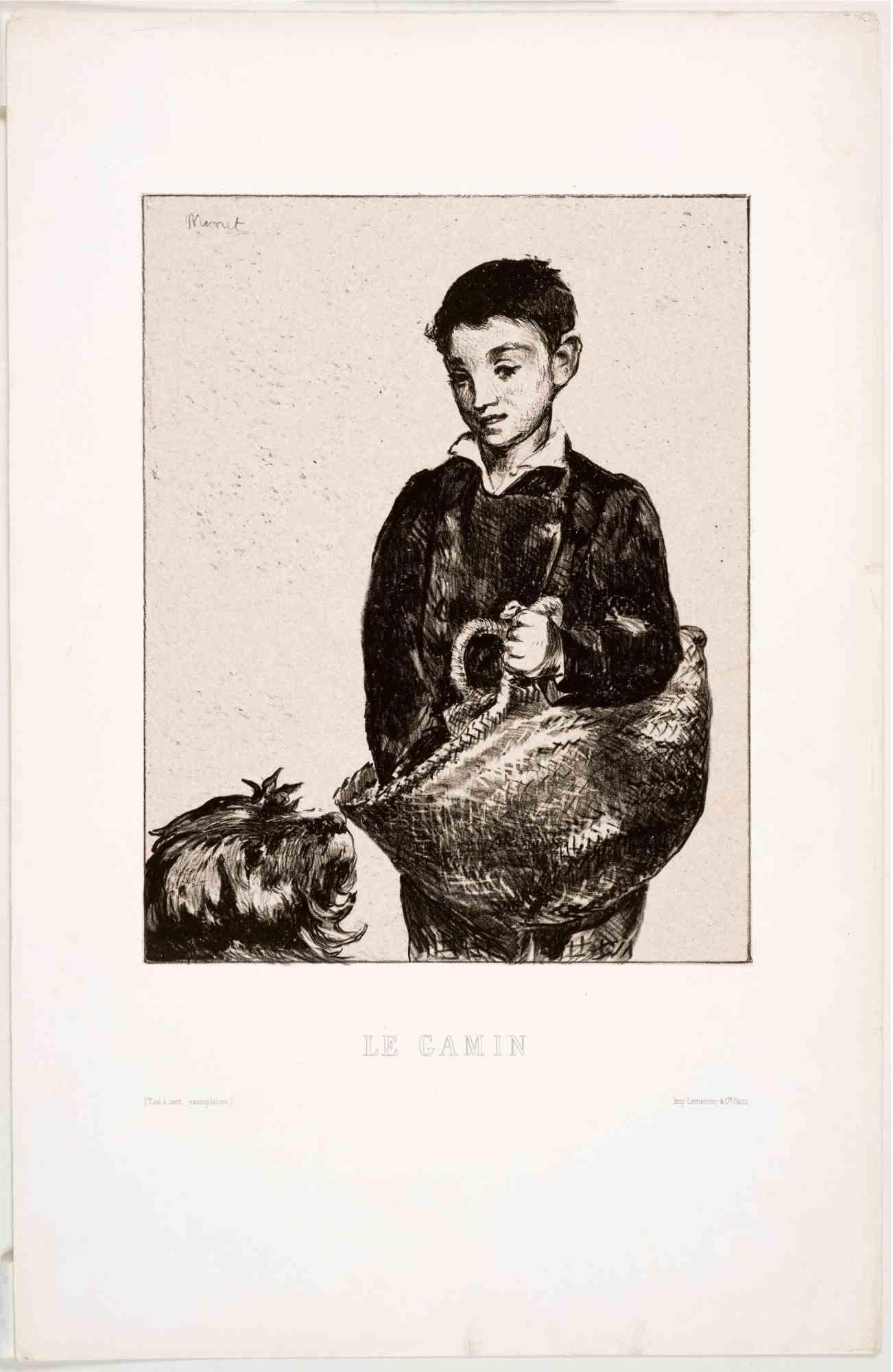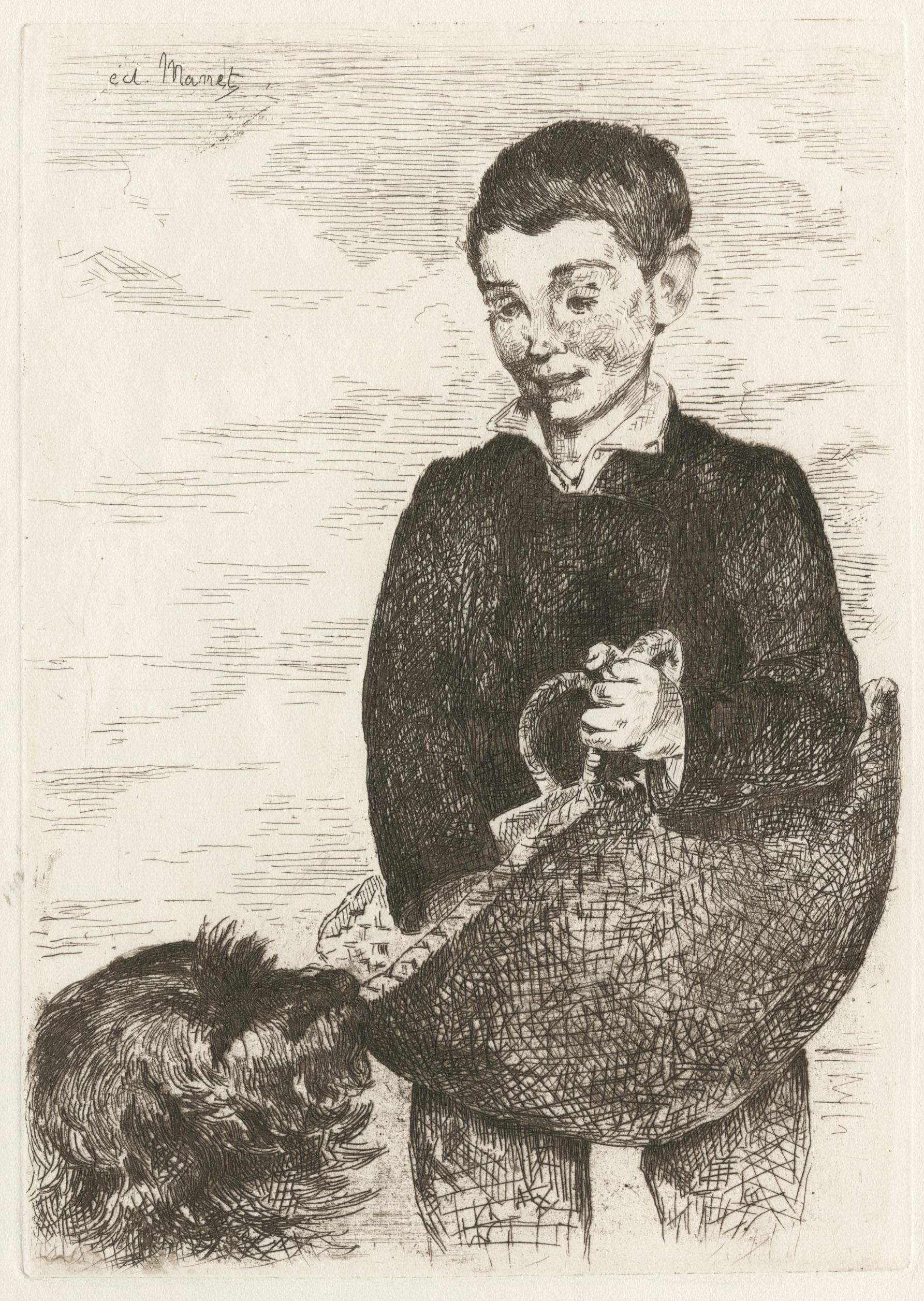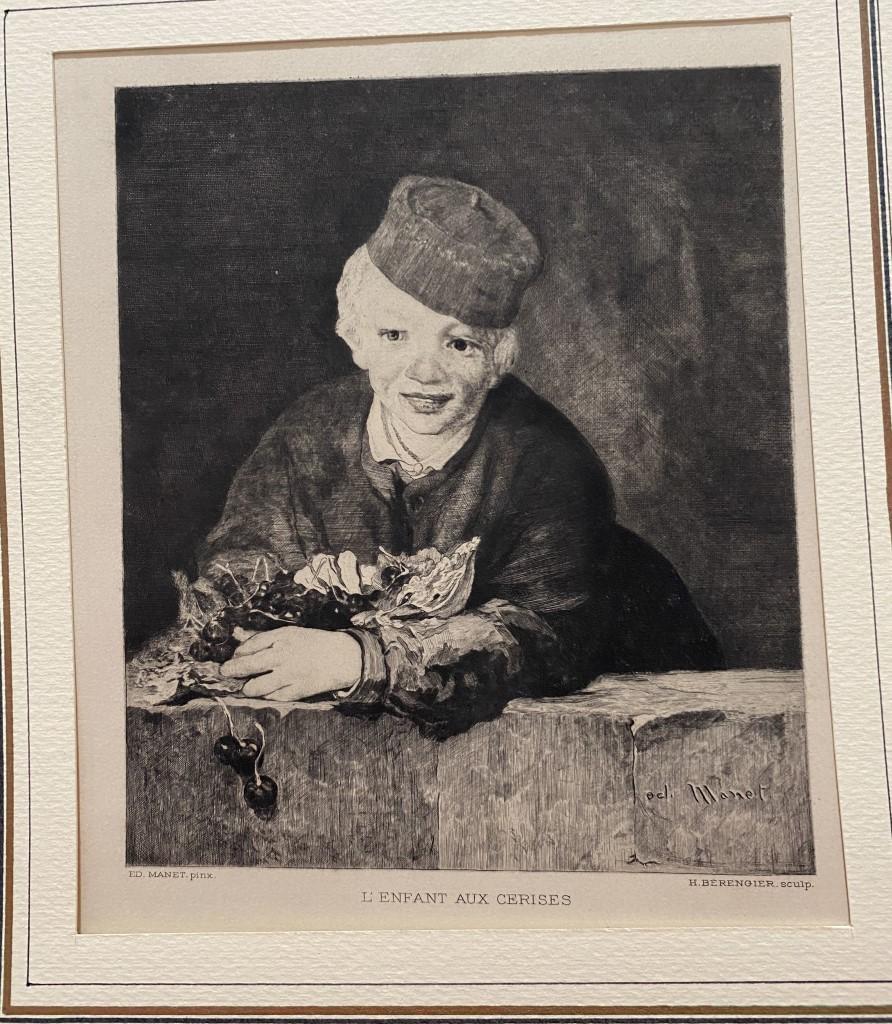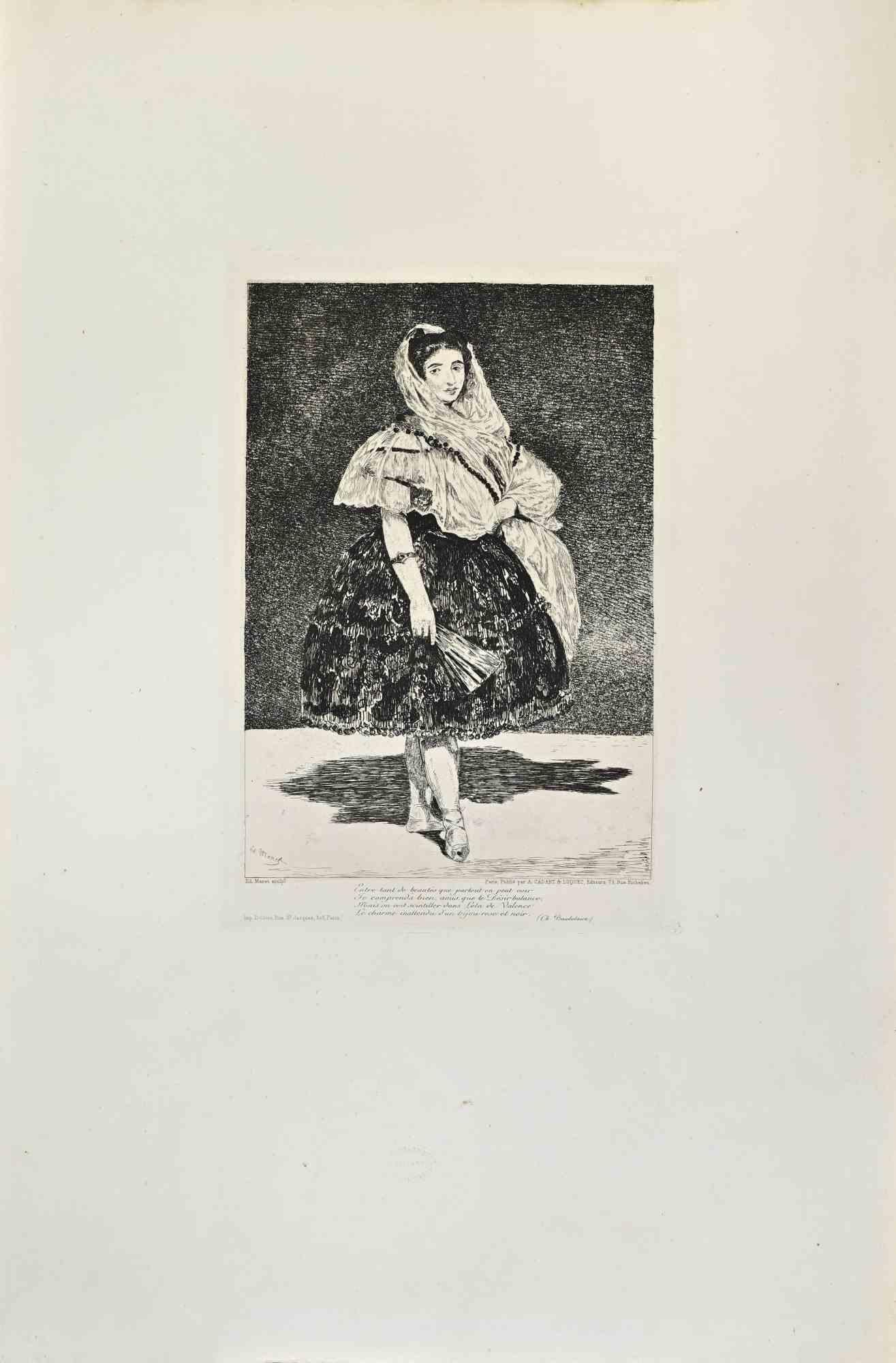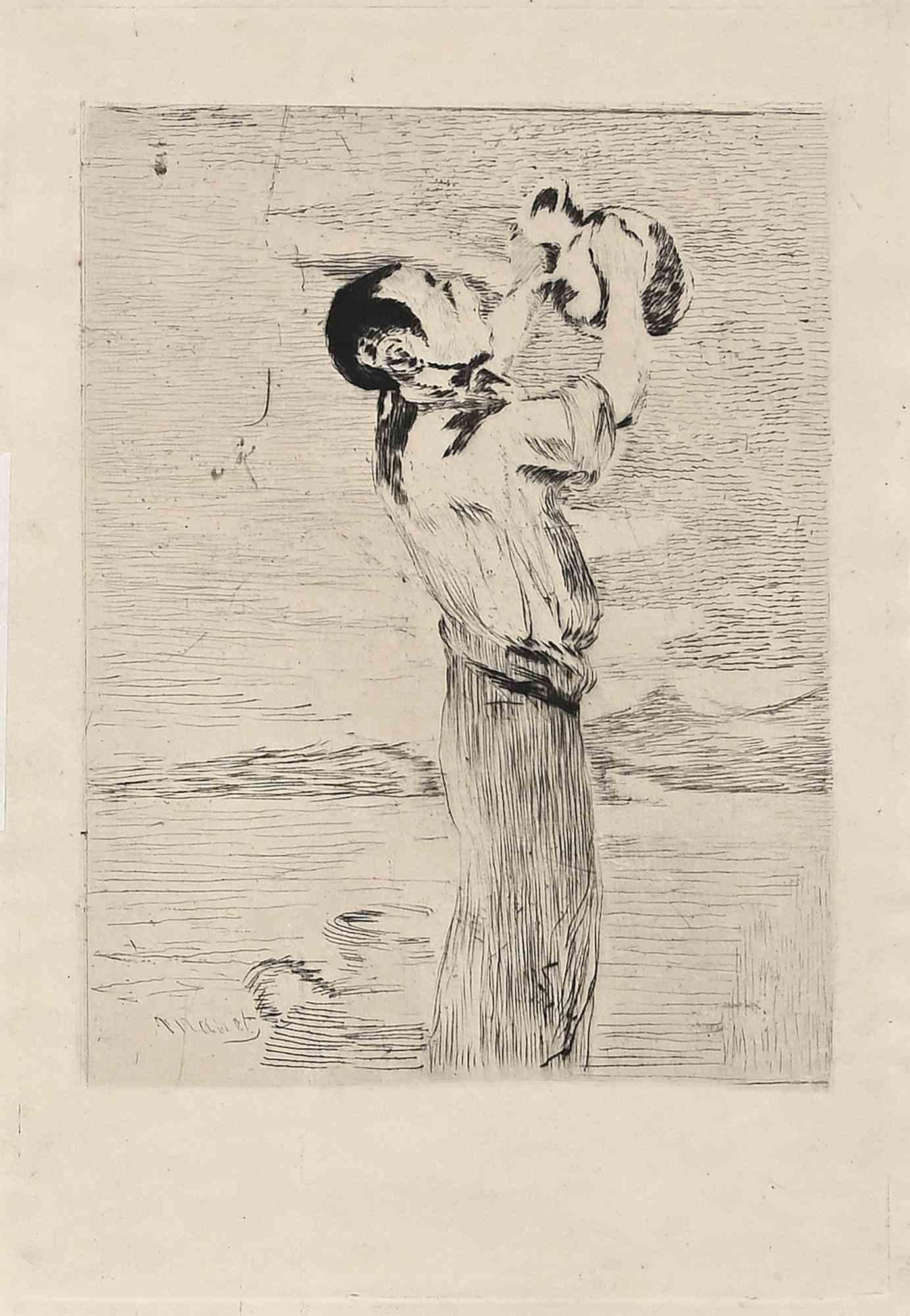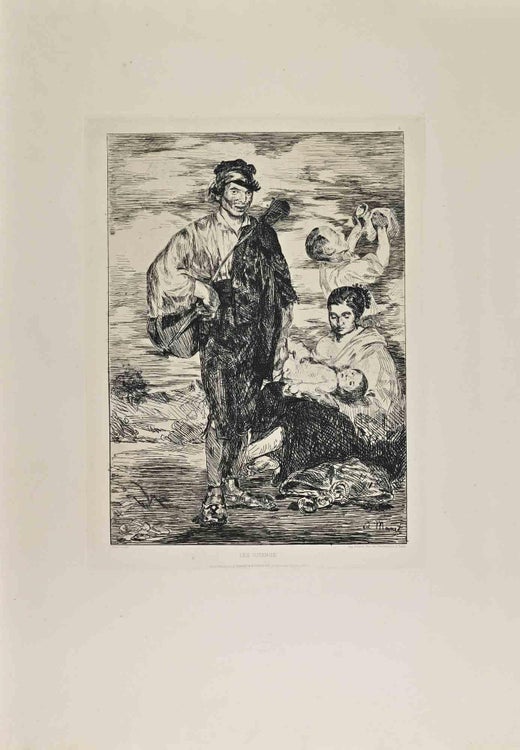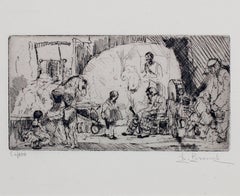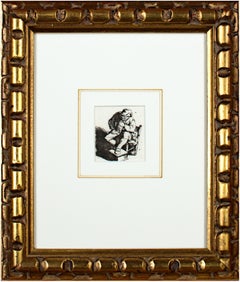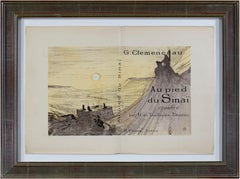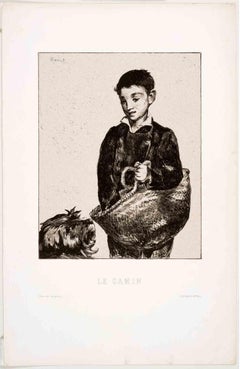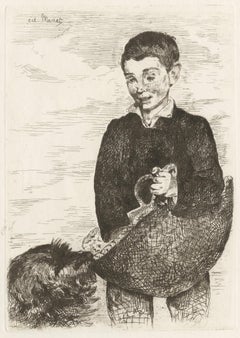Items Similar to "The Urchin (Le Gamin) -Second and Final State, " Etching signed by Edouard Manet
Want more images or videos?
Request additional images or videos from the seller
1 of 10
Édouard Manet"The Urchin (Le Gamin) -Second and Final State, " Etching signed by Edouard Manet1862
1862
$4,300
£3,342.14
€3,784.21
CA$6,143.88
A$6,689.24
CHF 3,502.40
MX$80,293.03
NOK 44,202.33
SEK 41,447.20
DKK 28,259.15
About the Item
"The Urchin (Le Gamin)" is an original etching by Edouard Manet. It depicts a young boy holding a basket with his long-haired dog. This is the second and final state and is signed upper left in plate "ed. Manet;" this is unique to the second state. Catalogue Raisonne: Harris 31
8" x 5 3/4" art
22" x 19 3/4" frame
Édouard Manet was the most important and influential artist to have heeded poet Charles Baudelaire's call to artists to become painters of modern life. Manet had an upper-class upbringing, but also led a bohemian life, and was driven to scandalize the French Salon public with his disregard for academic conventions and his strikingly modern images of urban life. He has long been associated with the Impressionists; he was certainly an important influence on them and he learned much from them himself. However, in recent years critics have acknowledged that he also learned from the Realism and Naturalism of his French contemporaries, and even from seventeenth century Spanish painting. This twin interest in Old Masters and contemporary Realism gave him the crucial foundation for his revolutionary approach.
His early masterworks, The Luncheon on the Grass (Le déjeuner sur l'herbe) and Olympia, both 1863, caused great controversy and served as rallying points for the young painters who would create Impressionism. Today, these are considered watershed paintings that mark the start of modern art. The last 20 years of Manet's life saw him form bonds with other great artists of the time, and develop his own style that would be heralded as innovative and serve as a major influence for future painters.
- Creator:Édouard Manet (1832 - 1883, French)
- Creation Year:1862
- Dimensions:Height: 22 in (55.88 cm)Width: 19.75 in (50.17 cm)
- Medium:
- Movement & Style:
- Period:
- Condition:
- Gallery Location:Milwaukee, WI
- Reference Number:Seller: 13679g1stDibs: LU60532486701
Édouard Manet
Edouard Manet (1832 – 1883) was a French painter. He was one of the first 19th-century artists to paint modern life, and a pivotal figure in the transition from Realism to Impressionism. Born into an upper-class household with strong political connections, Manet rejected the future originally envisioned for him, and became engrossed in the world of painting. His early masterworks, The Luncheon on the Grass (Le déjeuner sur l'herbe) and Olympia, both 1863, caused great controversy and served as rallying points for the young painters who would create Impressionism. Today, these are considered watershed paintings that mark the start of modern art. The last 20 years of Manet's life saw him form bonds with other great artists of the time, and develop his own style that would be heralded as innovative and serve as a major influence for future painters. Although harshly condemned by critics who decried its lack of conventional finish, Manet's work had admirers from the beginning. One was Emile Zola, who wrote in 1867: "We are not accustomed to seeing such simple and direct translations of reality. Then, as I said, there is such a surprisingly elegant awkwardness ... it is a truly charming experience to contemplate this luminous and serious painting which interprets nature with a gentle brutality."
About the Seller
4.9
Gold Seller
Premium sellers maintaining a 4.3+ rating and 24-hour response times
Established in 1966
1stDibs seller since 2017
452 sales on 1stDibs
Typical response time: 1 hour
- ShippingRetrieving quote...Shipping from: Milwaukee, WI
- Return Policy
More From This Seller
View All"Le Petit Cirque Prinder, " Original Etching signd by Auguste Brouet
By Auguste Brouet
Located in Milwaukee, WI
"Le Petit Cirque Prinder" is an original etching by Auguste Brouet. This piece depicts a variety of circus performers surrounded by small children. The artist signed the piece in the...
Category
1910s Academic Figurative Prints
Materials
Pencil, Etching
'The Smoker (Le Fumeur)' original etching by Cornelis-Pietersz Bega
By Cornelis Bega
Located in Milwaukee, WI
'The Smoker (Le Fumeur)' is an original etching by the celebrated Dutch painter and printmaker Cornelis-Pietersz Bega. It presents a genre scene of the type Bega was best known for: Bega's principal subjects were genre representations of taverns, domestic interiors and villages. He depicted nursing mothers, prostitutes, drunks, gamblers and fools such as quack doctors and alchemists. In this case, he shows a man seated on a chair with his foot on a flat stool and holding a smoking pipe. For Bega, this representation was more of a caricature than it was an image of a specific person, and such genre scenes would have held allegorical and symbolic meaning for the seventeenth-century viewer. During the seventeenth century, the Dutch of all levels of society consumed tobacco and alcohol, and these were an important part of the Dutch economy and a major source of wealth. At the same time, however, moralists and ministers sought to curb intoxication: they openly described drinking and smoking as sinful, immoral, and a general threat to one’s reputation. This paradox is reflected in prints such as this, which inherently carry the national pride of the Dutch economy alongside a moral warning in a print that could be just as easily consumed and collected.
2.5 x 2.25 inches, print
12.38 x 10.38 inches, frame
Framed to conservation standards using archival materials including 100 percent rag matting and mounting materials. Housed in a gold finish Spanish-style wood moulding.
Overall good and stable condition; margins cut to plate; some wrinkling in the corners from previous mounting; housed in a new custom frame.
Cornelis Bega was born into prosperous circumstances. His mother, Maria Cornelis, inherited half the estate (gold, silver, paintings, drawings and prints) and all of the red chalk drawings of her father, Cornelis Cornelisz van Haarlem, a renowned Mannerist artist. Bega's father was Pieter Jansz Begijn (d 1648), a gold and silversmith.
Like other family members, Bega was probably Catholic. Houbraken's claim that Bega studied with Adriaen van Ostade is likely to be correct; this was probably before 24 April 1653, when Bega joined Vincent Laurentsz. van der Vinne in Frankfurt for a journey through Germany, Switzerland and France. Bega had returned to Haarlem by 1 September 1654, at which time he joined the Guild of St Luke; he was already a competent draughtsman, as indicated by his first extant dated work, Interior with a Nursing Mother (1652; Frankfurt am Main, Städel. Kstinst.), and by a remarkable double portrait (Amsterdam, Rijksmuseum) drawn by him and Leendert van der Cooghen in 1654.
Bega painted, drew, etched and made counterproofs in a wide variety of materials on different types of small-scale supports. He may have been the first Dutch artist to make monotypes, but this remains controversial. Approximately 160 paintings, 80 drawings and six monotypes by Bega have been catalogued, as well as around 34 etchings.
Bega's principal subjects were genre representations of taverns, domestic interiors and villages. He depicted nursing mothers, prostitutes, drunks, smokers, gamblers and fools such as quack doctors and alchemists. Less common subjects include the ridiculed or pestered woman, as in Two Figures and Mother with a Spirits Bottle (c. 1662; Gouda, Stedel, Museum Catharina Gasthuis) and The Inn (etching), as well as witty satires on traditional scenes of middle-class music-makers, such as the Music Lesson (1663; Paris, Petit Palace).
Bega's early paintings, such as the Weaver's Family (c. 1652; St Petersburg, Hermitage), are freely executed, dark and coarse, recalling the many-figured peasant subjects of van Ostade. Between c. 1660 and 1664 he began to paint genre scenes with fewer figures, which are finely articulated, colourful and psychologically expressive, for example Two Men Singing (1662; Dublin, N.G.). His exquisite, late fijnschilderen ('fine painting') manner, evident in The Alchemist (1663; Malibu, Getty Museum), compares well with that of Gerrit Dou.
As a draughtsman Bega is noted for his single-figure studies, executed mainly in black and white chalk on blue paper or red chalk on white paper. None of the studies, which were drawn naer het leven (from life), seem to relate to a painting or etching. Bega traded drawings or shared models with other artists of the Haarlem school, including van der Cooghen, Gerrit Berckheyde, Dirck Helmbreker and Cornelis Visscher. These artists drew chalk figure studies in a very similar style, characterised by regular and precise parallel shading and well-defined forms; their drawings, especially those of Bega and Berckheyde, have been frequently confused. Unlike the realistic figure studies, Bega's etchings depict interiors with figures or single figures in the manner of van Ostade; the compositions, often with masterful chiaroscuro effects, reflect most closely the paintings of the 1650s.
Bega is likely to have remained in Haarlem, where he paid dues to the Guild in 1661. He probably died from the plague; fees for his expensive funeral at St. Bavo's were paid on 30 August 1664. Among the artists he influenced were Thomas Wijck, Jan Steen, Richard Brakenburg (1650-1702) and Cornelis Dusart. Painters such as R. Oostrzaen ( fl ?1656) and Jacob Toorenvliet...
Category
17th Century Old Masters Figurative Prints
Materials
Paper, Etching
19th century black and white etching aquatint outdoors figurative animal print
By Camille Pissarro
Located in Milwaukee, WI
"Vachere au Bord de L'Eau" is an original etching and aquatint by Camille Pissarro, the 8th state. It can be found in the catalogue raisonne Delteil #93. It features a woman sitting ...
Category
1890s Realist Figurative Prints
Materials
Etching, Aquatint
Toulouse Lautrec Original Lithograph Famous Political 1800s Collection Signed
By Henri de Toulouse-Lautrec
Located in Milwaukee, WI
"Lautrec Book: From Au Pied du Sinai written by Georges Clemenceau" lithographs created by the legendary Henri de Toulouse-Lautrec. This book, Au Pied...
Category
1890s Post-Impressionist Figurative Prints
Materials
Mulberry Paper, Lithograph
"La Plage de la Panne, " Seascape Etching signed by James Ensor
By James Ensor
Located in Milwaukee, WI
"La Plage de la Panne" is an original etching by James Ensor. The artist signed the piece in plate in the lower right and signed, titled, and dated it below t...
Category
Early 1900s Landscape Prints
Materials
Etching
"Le Portrait Termine, " Original Drypoint signed by Claude Weisbuch
By Claude Weisbuch
Located in Milwaukee, WI
"Le Portrait Termine" is an original drypoint etching by Claude Weisbuch. The artist signed the piece lower right and wrote the edition number (21/50) in...
Category
1970s Modern Figurative Prints
Materials
Drypoint, Etching
You May Also Like
Le Gamin - Etching by Edouard Manet - 1862
By Édouard Manet
Located in Roma, IT
Lithograph on chine collée on firm white paper.
Image dimension (chine collée) 28.7x22.7; Sheet size 50.4x32.6.
Not signed, as issued.
Lower inscribed and titled in typographic sc...
Category
1860s Impressionist Figurative Prints
Materials
Etching
Le Gamin (The Kid)
By Édouard Manet
Located in Fairlawn, OH
Le Gamin (The Kid)
Etching on laid paper, 1862
Signed in the plate upper left (see photo)
As published in Theodore Duret, L'Histoire d'Edouard Manet et de Son Ouvre, 1902 (The first ...
Category
1860s Impressionist Figurative Prints
Materials
Etching
Child with a Tray (Pear and Bottle) - Original Etching (Guerin #15)
By Édouard Manet
Located in Paris, IDF
Edouard MANET
Child with a Tray (Pear and Bottle), 1861
Original etching
Printed signature in the plate
On Japan paper 36 x 24 cm (c. 12 x 10 inch)
REFERENCES : Catalog raisonne Gu...
Category
1860s Impressionist Figurative Prints
Materials
Etching
L'Enfant Aux Cerises - Original Etching by H. Berengier after E. Manet - 1900
Located in Roma, IT
L'Enfant Aux Cerises is an original print in etching technique on ivory paper, realized after Edouard Manet (French Painter; 1832-1883) and by Henri Berengier, engraver and sculptor....
Category
1860s Figurative Prints
Materials
Etching
Lola De Valence - Etching by Edouard Manet - 1862
By Édouard Manet
Located in Roma, IT
Lola De Valence is a black and white etching realized by Edouard Manet (1832-1883) in 1862.
Image dimensions: 18x26 cm.
Etching and aquatint, 6th state, the first to be published, ...
Category
1870s Impressionist Figurative Prints
Materials
Etching
Le Buveur d'Eau (The Water Drinker) - Etching by Edouard Manet - 1870s
By Édouard Manet
Located in Roma, IT
Realized by Manet in 1870/1874, this famous subject was printed in an apparently unique lifetime proof, as stated in Harris' Catalog.
It was then printed in two posthumous edition, ...
Category
1860s Impressionist Figurative Prints
Materials
Etching
More Ways To Browse
Boy With Basket
Picasso Ecuyere
Picasso Farol
Picasso Lithograph Bathers
Picasso Lithograph Couple
Picasso Marlborough
Picasso Pencil Signed
Picasso Plates Signed
Picasso Series 156
Picasso Toros Vallauris
Picasso Woman With Hat
Pierre Etienne Moitte
Piranesi Prints Carceri
Pop Shop 1
Poster Mardi Gras
Raoul Dufy Horse Lithograph
Raoul Dufy Lithograph Ascot
Rare Album Covers
